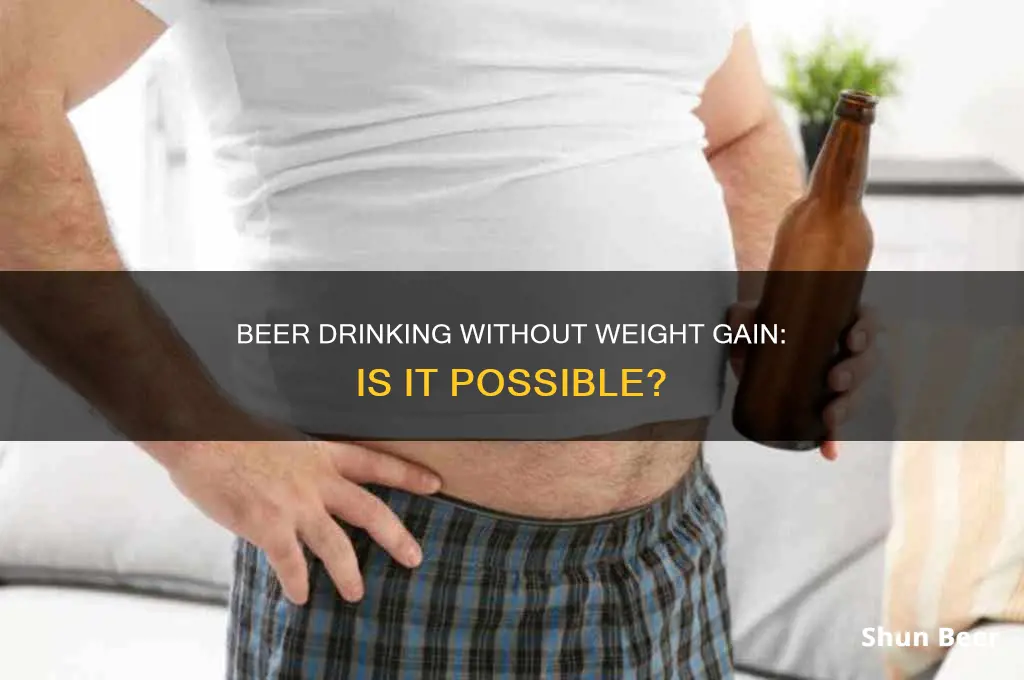
Alcohol is a toxin, and when consumed, the liver focuses on metabolizing and breaking it down, which means the body sacrifices metabolizing fat. This can lead to weight gain. Alcohol is also high in calories and can affect the hormones that control appetite, hunger and stress. However, this does not mean that drinking beer will inevitably lead to weight gain. Weight gain from alcohol consumption depends on various factors, including drinking and eating habits, physical activity levels, health, and unique body and lifestyle factors.
| Characteristics | Values |
|---|---|
| Alcohol consumption and weight gain | Alcohol consumption may lead to weight gain over time, but light-to-moderate drinking does not cause weight gain. |
| Calories in alcohol | Alcoholic drinks are high in calories, with 7 calories per gram compared to 4 for carbohydrates and protein, and 9 for fat. |
| Nutritional value | Alcohol has no nutritional value and is considered "empty calories." |
| Effect on fat burning | Alcohol stops the body from burning fat as the liver prioritises breaking down alcohol. |
| Effect on hunger | Alcohol can increase hunger and affect hormones that control appetite. |
| Food choices | Alcohol can lead to poor food choices and cravings for salty, greasy, or high-carb foods. |
| Sleep quality | Excess alcohol can negatively impact sleep quality, which may contribute to weight gain. |
| Individual factors | Whether alcohol consumption leads to weight gain depends on various individual factors, such as unique body composition, lifestyle, physical activity level, and health status. |
What You'll Learn

Alcohol is high in calories
The reason alcohol has so many calories is because it is a highly concentrated solution. Imagine drinking 40% milk fat—that's very fatty. Hard liquors are 40% alcohol by volume. That's 40% of a beverage that can be converted to energy—a lot of calories.
To put this in perspective, consider that whole milk is only about 4% fat. Although fat is a richer source of energy than alcohol, 6% alcohol content in beer can still add up. If you substitute 6% of your liquid intake (which is typically zero-calorie water) with 6% alcohol calories, you will gain weight.
The calories in alcohol are often referred to as "empty calories" because they provide little to no beneficial nutrients or minerals. Alcoholic beverages are often high in empty calories, and cocktails and mixed drinks tend to have more calories than beer and wine due to added liqueurs, juices, and syrups. For example, a piña colada can have as many as 500 calories in a seven-ounce serving.
Beer and wine are also high in calories. One drink can contain anywhere from 100 to 170 calories. A 12-ounce pale ale can have 175 calories, while a 12-ounce lager can have 170 calories. A five-ounce glass of red or white wine typically has about 160 calories, but this can range from 125 to upwards of 190 calories.
The high calorie content of alcohol can contribute to weight gain, especially when consumed in excess. Regular heavy drinking can lead to weight gain over time by affecting hormones that control appetite, hunger, and stress, and by interfering with fat metabolism.
Beer Drinking: Foot Pain and the Surprising Connection
You may want to see also

Alcohol stops your body from burning fat
The liver, which plays a role in the metabolism of fats, carbohydrates and proteins, is affected by alcohol consumption. Excess alcohol intake can lead to alcoholic fatty liver, which can damage the liver and affect the way the body metabolises and stores energy from food. This can make it very difficult to lose weight.
Alcohol also affects the hormones that control appetite, hunger and stress. It can impair the functions of glands that release hormones, which may cause weight gain. For example, the adrenal glands secrete cortisol, a stress hormone. Heavy drinking may cause the adrenal glands to stop regulating how much cortisol they secrete, leading to high cortisol levels. Elevated cortisol levels may increase abdominal weight gain, as it redistributes fat tissue to the abdominal region and increases cravings for high-calorie foods.
Alcohol also negatively affects sleep quality, and sleep deprivation may cause weight gain.
Beer and Swollen Feet: Is There a Connection?
You may want to see also

Alcohol affects your hormones
Alcohol affects the body's hormones in several ways. Firstly, it suppresses the function of the adrenal glands, which are responsible for regulating metabolism, blood pressure, and the immune system. This can lead to a range of issues, including increased food cravings, weight gain, decreased sexual response, and higher blood pressure. Alcohol also affects the body's production of insulin, a hormone that controls blood glucose levels, which can increase the risk of type 2 diabetes and hyperglycaemia.
Additionally, alcohol initially lowers cortisol levels, which can temporarily reduce stress, but over time, drinking can increase cortisol levels, leading to anxiety, digestive issues, mood swings, high blood pressure, and poor sleep. Alcohol also impacts the function of glands that release hormones, which may cause weight gain. Finally, alcohol can increase abdominal fat, especially in men, as it is prioritised by the liver for breakdown over fat.
Storing Beer: How Long Can You Keep It?
You may want to see also

Alcohol makes you hungry
Alcohol is a toxin, and your body treats it as such. When you consume alcohol, your body stops all other metabolic processes to rid itself of the toxin. This means that any food you eat while drinking is more likely to be stored as fat.
Alcohol is calorie-dense, with about seven calories per gram, making it nearly as dense in calories as fat. However, this does not contribute to satiation or the feeling of "fullness". Instead, it boosts the appetite. Alcohol suppresses the oxidation of fatty acids, which contributes to feelings of hunger as fatty acids play a role in appetite regulation. It also increases thermogenesis (calorie utilisation causing heat production) in the short term, which means you may feel hungry again faster than usual.
Alcohol stimulates or inhibits neurochemical systems that play a role in appetite regulation. It affects two primary hunger-regulating hormones: Leptin and GLP-1. These hormones suppress appetite and are either directly or indirectly inhibited when alcohol enters the body. As a result, you start feeling hungry after a few drinks, even if you are actually “full”. Alcohol also stimulates the same neurons in the brain that are triggered when the body goes into starvation mode. This stimulation could even lead to ethanol-induced overeating.
Alcohol also reduces self-control, so indulging in food cravings and overeating after drinking is commonplace. Studies have shown that alcohol doesn't increase hunger in general but rather increases hunger only once eating has begun. It also seems that alcohol can reduce how satiated or full we feel after eating.
If you want to avoid the "drunchies", it's best to avoid drinking alcohol altogether. However, if you do choose to drink, it's important to pace yourself and drink responsibly. Drinking water in between alcoholic drinks can help support your liver and kidneys, as well as help you feel more full. Eating a nutritious meal before drinking is also a good idea, as it will help you absorb the alcohol more slowly and make you less likely to make bad eating decisions later.
Beer Belly Blues: Stomach Pain After Drinking Beer, Why?
You may want to see also

Alcohol leads to poor food choices
Alcohol consumption can have a significant impact on an individual's food choices, often leading to poor dietary decisions. Here are some key reasons why alcohol leads to poor food choices:
Hormonal Impact
Alcohol can interfere with the hormones that regulate appetite, hunger, and stress. Specifically, it can affect the functioning of glands that release hormones like cortisol, which is linked to increased abdominal weight gain and cravings for high-calorie foods.
Increased Hunger and Cravings
Alcohol has been found to temporarily increase serotonin levels, which can influence hunger and food cravings. Additionally, alcohol lowers inhibitions, making it more likely for individuals to choose larger portions or less healthy options than they typically would.
Delayed Nutrient Absorption
When alcohol is consumed, the body prioritizes breaking down and eliminating it as a toxin. This delays the absorption and availability of nutrients from food, disrupting normal metabolic processes and potentially leading to increased fat storage.
Altered Blood Sugar Levels
Alcohol can cause a drop in blood sugar levels, leading to increased hunger and cravings for high-carbohydrate foods. This can be particularly concerning for individuals with diabetes, as it may impact their blood sugar management.
Poor Food Choices
Alcohol consumption is often associated with the consumption of high-fat, high-carbohydrate, and high-calorie foods. These types of food choices can further contribute to weight gain and negatively impact overall health.
Dehydration and Disrupted Sleep
Alcohol is a diuretic, which can lead to dehydration. Additionally, excessive alcohol consumption can disrupt sleep quality and duration. These factors can contribute to fatigue, decreased willpower, and increased cravings for unhealthy foods.
Beer after wine: Is it a good idea?
You may want to see also
Frequently asked questions
Yes, it is possible to drink beer without gaining weight, but it depends on various factors, including your overall diet, physical activity, and unique body and lifestyle. However, beer is high in calories and can range from 100 to 350 calories per 12-ounce serving.
Beer consumption can impact your weight in several ways. Firstly, it can stop your body from burning fat, as your liver prioritizes breaking down alcohol instead. Secondly, beer is high in calories and can contribute to excess calorie intake. Lastly, drinking beer can increase your appetite and lead to cravings for unhealthy foods.
Yes, distilled spirits like gin, rum, vodka, and whiskey contain around 100 calories per 1.5-ounce serving. Additionally, light beer has fewer calories than regular beer, typically containing about 100 calories per 12-ounce serving.
It is recommended to drink in moderation, which means no more than one drink per day for women and no more than two drinks per day for men. If you are trying to lose weight, you may need to consume less.
Here are some strategies to consider:
- Choose lower-calorie beers or light beers.
- Track your calorie intake and stay within your daily limits.
- Eat a healthy meal or snacks, such as fruits, vegetables, or lean protein, before drinking to avoid making unhealthy food choices.
- Stay hydrated by drinking water before, during, and after drinking beer.







